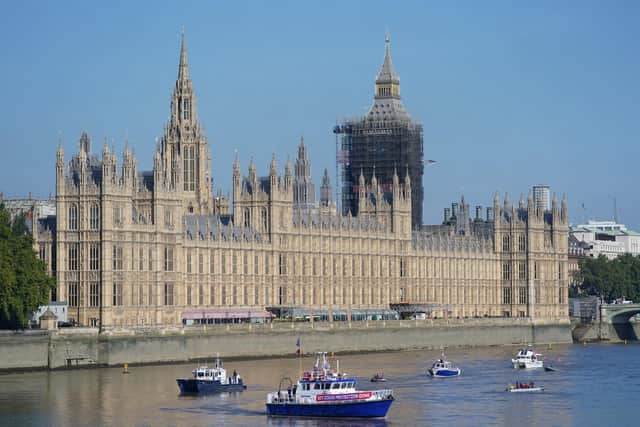Contractors face "extreme financial hardship" due to loan charge, says leading tax lawyer Sarah Gabbai
Sarah Gabbai, a senior associate at McDermott Will & Emery UK LLP, is a member of a group of sector professionals which has published a proposal to provide “a fair and final resolution” to the loan charge. The group claims it will give closure to taxpayers facing the loan charge and HMRC.
The proposal, which has been submitted in a letter to the Chancellor Rishi Sunak, is for HMRC to offer a settlement opportunity for those facing the loan charge and those who have had to settle to avoid it, with taxpayers paying an “affordable proportion” of the tax that HMRC believes is owed.
Advertisement
Hide AdAdvertisement
Hide AdThe group said: “The proportion would also reflect the fact that people were victims of mis-selling and also the fact that it is unfair for the taxpayer to be pursued for the whole sum.”


In many cases agencies and umbrella companies were all involved and profited, the group’s statement added.
Ms Gabbai said: “I would like to see HMRC and the Government take a constructive approach to the fact that thousands of contractors and freelancers have effectively been forced to use ‘disguised remuneration’ tax avoidance schemes, resulting in extreme financial hardship and other devastating consequences for those affected and their families.
“The current approach of continuing to issue tax demands under the loan charge, or the threat thereof, is self-defeating, unsustainable, and not in anyone’s best interests.”
Advertisement
Hide AdAdvertisement
Hide AdMs Gabbai said she would like to see the Government and HMRC work with professional bodies and tax professionals to find a solution that works for everyone.


Ms Gabbai added: “The proposal I put forward to the Loan Charge and Taxpayer Fairness All Party Parliamentary Group..aims to achieve this.
"It invites the Government and HMRC to consider a ‘disguised remuneration’ settlement opportunity that would reflect the fact that agencies should have operated PAYE; that affected taxpayers were either mis-sold these schemes by promoters or inadvertently dragged into them; and that the loan charge does not allow closure and finality for affected taxpayers.”
"An advantage of a settlement opportunity as a potential solution is that, unlike passing legislation, it would be relatively straightforward for HMRC to implement, and there is precedent for it.
Advertisement
Hide AdAdvertisement
Hide Ad"I would also strongly recommend that they consider the points raised by the CIOT (Chartered Institute of Taxation) and the LITRG(Low Incomes Tax Reform Group) in their Budget Representations, particularly the CIOT’s comments about protecting affected taxpayers from loan repayment demands where the “loan” in question has also been subject to tax as earnings."
"All we can do now is hope that the Government and HMRC will listen and take this seriously”.
Tax barrister Keith Gordon, who is supporting the proposal said: “We strongly believe that now is the time for all parties to work together to agree a common sense, compassionate resolution for all those who have been affected by the Loan Charge.
"This has been a very controversial issue and one that continues to be a source of anxiety for those affected, a huge administrative burden for HMRC and a difficult issue politically for the Government."
Advertisement
Hide AdAdvertisement
Hide AdA Government spokesperson said: “The Loan Charge was introduced to ensure those who used disguised remuneration tax avoidance schemes paid their fair share of income tax and national insurance contributions. It is only right that we continue to tackle these type of avoidance schemes as they deprive our public services of vital funding.”
“We encourage anyone who is worried about paying the Loan Charge to contact HMRC so they can help. HMRC are committed to working with taxpayers to enter manageable payment plans to spread their tax liability and ensure that they are affordable.”
"Lord Morse led an independent review into the policy in 2019 and concluded that it was right that the loan charge remain in force. The Government recognised concerns around its impact, which is why it accepted all but one of the recommendations made, leading to significant changes in legislation.
"Lord Morse made clear in his report that his recommended changes to the Loan Charge policy applied to both individuals and employers, unless otherwise specified, as Finance Act 2017 did not draw a distinction between the two.
Advertisement
Hide AdAdvertisement
Hide Ad"HMRC will take action against schemes marketed as enabling contractors to pay less tax than they should. Contractors who are worried that they have been offered such a scheme can contact HMRC.
"Around 20 promoters have moved out of promoting altogether in the last six years due to HMRC activity.
"In November 2021 HMRC refreshed its awareness campaign “Tax Avoidance – Don’t get caught out” targeted at contractors in key industries where promoters are particularly active.
"This campaign advises taxpayers how to spot avoidance schemes, including those promoted by umbrella companies, explains the risks involved and where people can get more information to enable them to make informed choices if they want to leave an avoidance scheme.
Advertisement
Hide AdAdvertisement
Hide Ad"There is a new interactive risk checker to help contractors check how they’re being paid and whether they are at risk of being involved in tax avoidance."
Support The Yorkshire Post and become a subscriber today. Your subscription will help us to continue to bring quality news to the people of Yorkshire. In return, you'll see fewer ads on site, get free access to our app and receive exclusive members-only offers. Click here to subscribe.
